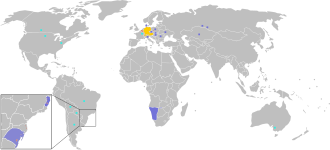German language
German (German: Deutsch) is a West Germanic language. It is spoken in Germany, Austria, Switzerland, Liechtenstein and Luxembourg; natively by around 100 million people. It is the most spoken first language within European Union. There are some people who speak German in Belgium, the Netherlands, France and Northern Italy. There are people who speak German in many countries, including the United States and Canada, where many people emigrated from Germany. It is also spoken in Eastern Europe, Bulgaria, Romania, and Russia.
German is a part of the West Germanic language family and is much like English and Dutch. Much of the vocabulary in German is related to English, but the grammar is more complicated.[4]
German has a system of cases, and when helping verbs are used, the main part of the verb must be moved to the end of the sentence. For example, "Someone has stolen my car" is Jemand hat mein Auto gestohlen ("Someone has my car stolen"), and "Someone called me last night" is Jemand hat mich letzte Nacht angerufen ("Someone has me last night called").
In writing, every noun must start with a capital letter. German is the only language that still has that rule, but Danish and English did so a long time ago.
Standard German is an official language in Switzerland, but the Swiss dialect of German is difficult to understand for native speakers from Germany and even for Swiss who are not native to speaking German.[5] One reason that the dialects are still so different today is that even if Switzerland adopted Standard German, mostly as a written standard, German Swiss in World War II wanted to separate themselves from the Nazis by choosing to speak dialect over the Standard German.[6]
Swiss German also has some differences in spelling, for example, the letter ß, which is used only in German, is replaced by ss.
Dialects
- Alsatian
- Bavarian dialect
- Franconian Dialect
- Kölsch
- Low Saxon
- Swiss dialect
- Mannheimerisch dialect
- Palatinate German
- Russian (Siberian) dialect
German numbers
German numbers are similar to their English counterparts. Like most languages, the German number system is based mainly on the first 10 numbers. They occur over and over throughout all the higher numbers. However, there is one big difference. Numbers like 21, 45 and 98 have the single digit first, with und connecting it to the tens as individual words, for example, einundzwanzig, fünfundvierzig und achtundneunzig.
| English | German |
|---|---|
| 1 | Eins |
| 2 | Zwei |
| 3 | Drei |
| 4 | Vier |
| 5 | Fünf |
| 6 | Sechs |
| 7 | Sieben |
| 8 | Acht |
| 9 | Neun |
| 10 | Zehn |
German Language Media
The Germanic languages in contemporary Europe
German language area and major dialectal divisions around 1900
Modern High German translation of the Christian Bible by the Protestant reformer Martin Luther (1534). The widespread popularity of the Bible translated into High German by Luther helped establish modern Standard German.
Map of Central Europe in 1648:* Territories under the Holy Roman Empire, comprising the Alpine heartland (Erblande) of the Habsburg monarchy.
Ethnolinguistic map comprising the territories of Austria-Hungary (1910), with German-speaking areas shown in red
References
- ↑ Mikael Parkvall, "Världens 100 största språk 2010" (The World's 100 Largest Languages in 2010), in Nationalencyklopedin
- ↑ 2.0 2.1 2.2 Ammon, Ulrich (November 2014). Die Stellung der deutschen Sprache in der Welt (in German) (1st ed.). Berlin, Germany: de Gruyter. ISBN 978-3-11-019298-8. Retrieved 24 July 2015.
{{cite book}}: CS1 maint: unrecognized language (link)[page needed] - ↑ "Rat für deutsche Rechtschreibung – Über den Rat". Rechtschreibrat.ids-mannheim.de. Archived from the original on 26 December 2018. Retrieved 11 October 2010.
- ↑ Up, Topics. "Japanese vs German". Archived from the original on 2023-05-31.
- ↑ "German Numbers: Learn To Count From 0 To 1,000+". Language Throne. 2020-10-01. Retrieved 2021-09-09.
- ↑ "Languages of Switzerland". YouTube. Archived from the original on 2016-09-09.
Notes
Other websites
| This language has its own Wikipedia project. See the German language edition. |
- Online German Language Course An online German language course that includes lessons covering pronunciation, vocabulary, and grammar.
- German phrasebook at Wikivoyage
- Learn to Speak German Archived 2013-06-08 at the Wayback Machine Student Resource
- Free German Language Course Archived 2013-02-17 at the Wayback Machine
- German Thesaurus Archived 2018-03-31 at the Wayback Machine










